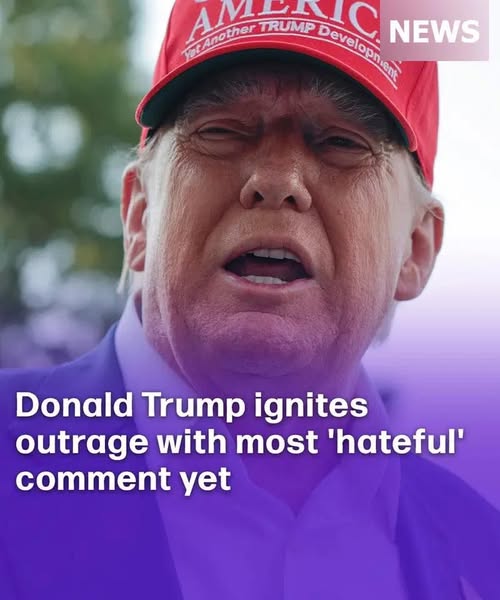Donald Trump Sparks Backlash Over “Hateful” Remarks Following Passage of Controversial Mega-Bill On July 3, President Donald Trump secured a narrow legislative victory with the passage of his sweeping “One Big Beautiful Bill,” approved in the House of Representatives by a slim margin of 218 to 214. While supporters hailed it as a bold, transformative move, the bill and Trump’s remarks surrounding it have ignited a firestorm of public outrage and renewed national division. The legislation itself is massive in scope. It merges deep tax cuts, massive military expansion, strict immigration crackdowns, and dramatic social spending cuts into one consolidated…On July 3, President Donald Trump secured a narrow legislative victory with the passage of his sweeping “One Big Beautiful Bill,” approved in the House of Representatives by a slim margin of 218 to 214. While supporters hailed it as a bold, transformative move, the bill and Trump’s remarks surrounding it have ignited a firestorm of public outrage and renewed national division.
The legislation itself is massive in scope. It merges deep tax cuts, massive military expansion, strict immigration crackdowns, and dramatic social spending cuts into one consolidated package. Trump’s base celebrated the bill as a strong expression of his “America First” agenda. However, critics from across the political spectrum have denounced it as fiscally reckless and morally damaging — one that disproportionately favors the wealthy while gutting vital services for the poor and vulnerable.
Adding fuel to the fire was Trump’s speech in Des Moines, Iowa, where he openly lashed out at his critics. “They hate Trump, but I hate them too… I really can’t stand them. Because I believe they hate our country,” he declared during his rally. The comment immediately went viral, drawing widespread condemnation for being divisive, inflammatory, and, according to many, unbecoming of a sitting president.
Political analysts and civic leaders warned that such language only deepens the country’s already dangerous political polarization. “A president’s job is to serve the entire nation — not just his supporters,” one constitutional law expert noted. “Expressing open hatred toward political opponents is irresponsible and erodes the foundation of democracy.”
At the heart of the “One Big Beautiful Bill” is a $4.5 trillion extension of Trump’s 2017 tax reforms. These reforms were initially set to expire in 2025, but the new bill not only extends them but expands benefits heavily toward top earners and large corporations. While middle-income Americans may see minor relief, economic analysts argue that the lion’s share of gains will go to the wealthiest citizens — a move likely to widen the wealth gap even further.
In stark contrast to the generous tax breaks, the legislation slashes over $1 trillion from Medicaid, severely undermining access to healthcare for millions. It also imposes tougher work requirements on food stamp (SNAP) recipients and Medicaid users, changes projected to leave up to 12 million Americans uninsured over the next decade. Healthcare professionals and anti-poverty advocates have labeled the cuts “devastating,” warning they could drive countless families into deeper hardship.
The bill also allocates more than $145 billion for immigration enforcement. This includes significant investments in new border fencing, surveillance systems, and the expansion of detention centers. A staggering $100 billion is being funneled to Immigration and Customs Enforcement (ICE) alone. Civil rights organizations have sounded the alarm, predicting a sharp rise in raids, detentions, and family separations — all hallmarks of Trump’s earlier immigration policies.
Meanwhile, the U.S. military is poised to receive a historic funding boost, with $150 billion earmarked for weapons modernization, advanced defense systems, and increased troop deployments. Supporters claim the move will secure America’s global military dominance, while detractors argue it redirects essential funding away from pressing domestic needs like education, housing, and infrastructure.
Economists are also deeply concerned about the fiscal impact. The bill is projected to add between $3 and $4 trillion to the national debt over the next ten years. Though Trump and his allies insist that economic growth will eventually balance the books, most budget experts consider such predictions overly optimistic, if not unrealistic. Many warn that younger generations will be left to grapple with the consequences of massive debt and shrinking public services.
As the country grapples with the full implications of this legislation, Trump’s language and tone continue to dominate headlines. His statement in Iowa — equating political opposition with hatred for America — was widely seen as an escalation in the cultural and ideological warfare that has come to define the Trump era.
For many, the bill represents more than policy. It’s become a symbol of the stark divide between two competing visions for America’s future: one favoring nationalist priorities and individual wealth, the other advocating for social equity and government responsibility.
With the “One Big Beautiful Bill” now passed and protests mounting, it’s clear that the battle over the country’s values, direction, and leadership is far from over. What remains uncertain is whether these divisions can be bridged — or if this latest chapter will only push the nation further apart.



